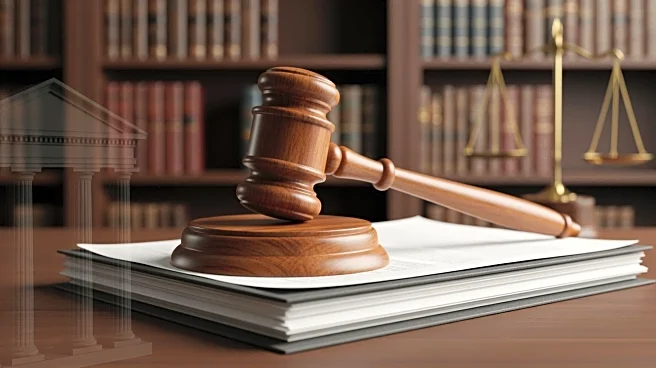What's Happening?
Sean C. Dunn, a Washington D.C. resident, was acquitted of misdemeanor assault charges after allegedly throwing a Subway sandwich at a U.S. Border Patrol agent. The incident, which occurred in August,
became a focal point in the Trump administration's law enforcement policies. The jury's decision came after seven hours of deliberation, marking the end of a three-month legal battle. The government had initially attempted to charge Dunn with a felony, but failed to convince a grand jury. The case was spearheaded by Jeanine Pirro, the U.S. attorney in Washington, who aimed to make Dunn's prosecution a key example of President Trump's aggressive policing strategy. Despite the government's efforts, Washington residents have twice rejected the charges against Dunn, reflecting broader resistance to the administration's crackdown on protests.
Why It's Important?
The acquittal of Sean Dunn underscores the complexities and public resistance faced by the Trump administration in enforcing its law enforcement policies. This case highlights the challenges in prosecuting individuals involved in protests against the administration, particularly in Washington D.C., a city with a history of political activism. The jury's decision may embolden other protesters and critics of the administration, potentially leading to increased demonstrations and legal challenges. The outcome also raises questions about the effectiveness and fairness of the administration's approach to handling dissent, which could influence public opinion and policy discussions on civil liberties and law enforcement practices.
What's Next?
Following the acquittal, it is likely that the Trump administration will reassess its strategy in prosecuting similar cases. The decision may prompt legal and political debates on the balance between maintaining public order and respecting civil liberties. Stakeholders, including civil rights groups and political leaders, may push for reforms in how protest-related cases are handled. Additionally, the outcome could lead to increased scrutiny of the administration's law enforcement policies, potentially influencing future legislative actions or court rulings.
Beyond the Headlines
The case of Sean Dunn may have broader implications for the legal system and civil rights in the U.S. It highlights the tension between government authority and individual rights, a theme that resonates in the current political climate. The acquittal could serve as a precedent for future cases involving protest actions, influencing how courts interpret intent and harm in similar situations. Moreover, it may contribute to ongoing discussions about the role of law enforcement in political protests and the protection of free speech.









